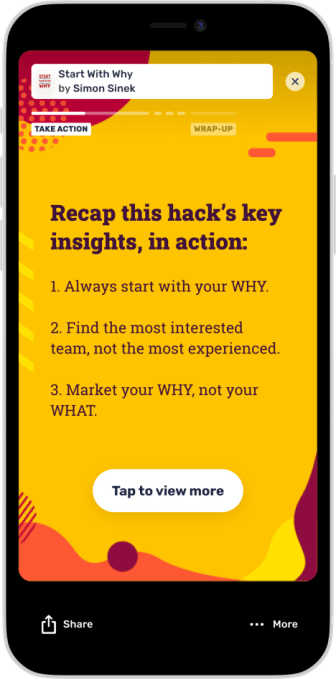Uptime, the self-described “knowledge hacking” app, has raised $16 million in seed funding, after officially launching on iOS in January.
Positioned as a “micro-learning” platform,” Uptime presents five-minute “knowledge hacks” from books, courses and documentaries. The idea is to let you quickly “grasp ideas and insights from trusted authors, instructors, and creative minds,” without spending too much of your precious time. In return, content creators — from those on The New York Times bestseller list to the most relevant courses and Academy Award-winning documentaries — get a new way to reach audiences who may go on to purchase the full works.
In other words, chalk this up as part content aggregator and discovery, and part lead generation for the actual content creators. Built, of course, for the short attention spans of millennials and Gen Z. Or so the pitch goes.
“Hacks are presented in a unique visual story format, designed to be inspirational and make learning effective, fun, engaging, and shareable – all verified by a team of experts,” explains the company. “At the end of each Hack, the user is presented with the option to buy the book, watch the full documentary or sign up for the course from the original source”.

Image Credits: Uptime
The seed funding comes from Uptime’s founders — serial entrepreneurs Jamie True and Jack Bekhor, who previously founded LifeWorks (acquired in 2018 for $325 million), and former YouTube and Facebook executive Patrick Walker — alongside other private investors. They include Lord David Alliance, ex-CEO of Tesco Sir Terry Leahy and unnamed members of private equity firm Thomas H Lee (THL).
“The global edtech market was valued at around [over] $89 billion last year, with people spending hundreds of dollars on online courses, building up their soft skills and watching documentaries,” says Uptime’s Patrick Walker. “It’s a huge opportunity for educational content creators but for customers, it leads to information overload and it can be hard to cut through and find the quality in what feels like an oversaturated market.
“With Uptime, we wanted to create something that could be a one-stop shop for knowledge. Instead of sifting through bestseller lists, endless sites of digital courses, and video platforms for documentaries, Uptime presents the best content from only the most trusted experts, organisations and sources. People can select the topics they’re interested in and gain access to the key elements of the content in snackable, easy-to-watch visual stories, audio and text”.
Uptime’s founders say the platform is aimed at anyone who wants to learn but only has a short amount of time, energy and/or limited resources to do so. “It’s perfect for Gen Z, millennials, parents, anyone with an interest in enhancing their personal or career prospects, and a desire to fill their time with constructive and uplifting content,” says Walker.
One criticism that could be levied at an app like Uptime is that it is another example of a parasitic aggregator, essentially monetising other people’s work. Its makers argue the opposite, and say that the app is actually helping to deliver a new audience to a creator’s work by providing a taster.
“At the end of each Hack, there is a link for people to go on and purchase the book, course or documentary, thereby delivering new audiences to creators,” adds Walker. “The authors and creators we’ve reached out to are extremely enthusiastic about their work being on Uptime. We’ve had support from the likes of Lily Cole, Oobah Butler and Dr Tara Swart… The idea is that everyone can benefit from Uptime; the users and the content creators”.





































